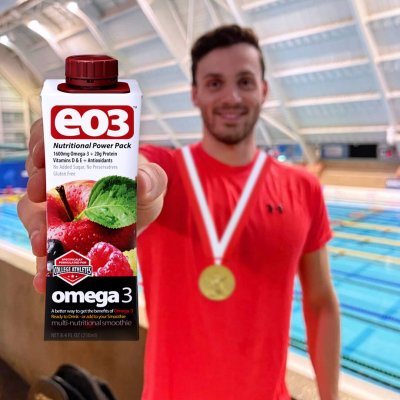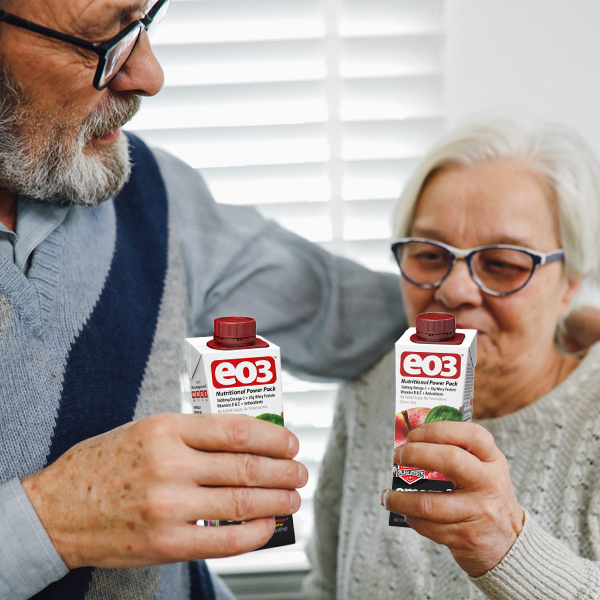References
Claim: Inflammation relief
Source: The inflammation reduction properties of omega-3 are well documented by many clinical studies around the world. Here are a few sample sources that show omega-3 has a positive effect on inflammation;
DiNicolantonio, James J., and James H O’Keefe. “Importance of maintaining a low omega–6/omega–3 ratio for reducing inflammation.” Open Heart, vol. 5, no. 2, 2018. ProQuest, https://libezproxy.syr.edu/login?url=https://www.proquest.com/scholarly-journals/importance-maintaining-low-omega-6-3-ratio/docview/2139016063/se-2, doi:https://doi.org/10.1136/openhrt-2018-000946.
- Philip C. Calder. Omega-3 Fatty Acids and Inflammatory Processes. 2010 Mar; 2(3): 355–374. Increased membrane content of EPA and DHA can modify membrane fluidity, cell signaling, altered gene expression and the pattern of lipid mediator production. It also results in increased production of anti-inflammatory eicosanoids and resolvins. The anti-inflammatory effects of marine n-3 PUFAs suggest that they may be useful as therapeutic agents in disorders with an inflammatory component.
- Philip C Calder. Omega-3 fatty acids and inflammatory processes: from molecules to man. Biochem Soc Trans. 2017 Oct 15;45(5):1105-1115. EPA and DHA mechanisms of action include altered cell membrane phospholipid fatty acid composition, disruption of lipid rafts and inhibition of pro-inflammatory transcription factors which reduces expression of inflammatory genes.
- Artemis P Simopoulos. Omega-3 fatty acids in inflammation and autoimmune diseases. J Am Coll Nutr. 2002 Dec;21(6):495-505. – Coronary heart disease, major depression, aging and cancer are characterized by an increased level Interleukin 1 (IL-1), a proinflammatory cytokine. Similarly, high levels of IL-1 can be seen in arthritis, Crohn’s disease, ulcerative colitis and lupus erythematosis. Studies have shown that fish oil supplementation in chronic inflammatory diseases can decrease disease activity, partly due to reducing levels of IL-1.
- Philip C Calder. Polyunsaturated fatty acids, inflammatory processes and inflammatory bowel diseases. Mol Nutr Food Res. 2008 Aug;52(8):885-97. – Fish oil supplementation in patients with inflammatory bowel diseases results in n-3 PUFA incorporation into gut tissue and modification of inflammatory mediator profiles.
- Zuhair S. Natto, Wael Yaghmoor, Heba K. Alshaeri, Thomas E. Van Dyke. Omega-3 Fatty Acids Effects on Inflammatory Biomarkers and Lipid Profiles among Diabetic and Cardiovascular Disease Patients: A Systematic Review and Meta-Analysis. Scientific Reports volume 9, Article number: 18867 (2019) – Omega-3 fatty acids may be associated with lower inflammatory biomarkers among diabetic and cardiovascular patients.
- Rebecca Wall, R Paul Ross, Gerald F Fitzgerald, Catherine Stanton. Fatty acids from fish: the anti-inflammatory potential of long-chain omega-3 fatty acids. Nutrition Reviews, Volume 68, Issue 5, 1 May 2010, Pages 280–289 – EPA and DHA have anti-inflammatory properties, traditionally attributed to their ability to inhibit the formation of pro-inflammatory n-6 PUFA-derived eicosanoids. Increasing intake of EPA and DHA may reduce the incidence of many chronic diseases that involve inflammatory processes.
- Xiaoxi Li, Xinyun Bi, Shuai Wang, Zongmeng Zhang, Fanghong Li Allan Z. Zhao. Therapeutic Potential of ω-3 Polyunsaturated Fatty Acids in Human Autoimmune Diseases. Immunol. 2019 – Many of the beneficial effects of ω-3 PUFAs can be traced back to their anti-inflammatory actions as well as the regulation of mTOR activity. Evidence has demonstrated that EPA and DHA, can suppress inflammation and have beneficial roles in a variety of human diseases
- Trevor A. Mori Lawrence J. Beilin.Omega-3 fatty acids and inflammation. (2004) Current Atherosclerosis Reports volume 6, 461–467 – Clinical trials have demonstrated the anti-inflammatory benefits of n-3 fatty acids in rheumatoid arthritis, psoriasis, asthma, and inflammatory bowel disorders as well as atherosclerosis
- Bäck, M., Hansson, G. K. Omega-3 fatty acids, cardiovascular risk, and the resolution of inflammation. (2019) FASEB J. 33, 1536–1539 – Recent experimental studies have shown that anti-inflammatory and pro-resolving effects of lipid mediators derived from ω-3 fatty acids inhibit atherosclerosis highlighting its potential use in either primary or secondary prevention of cardiovascular disease.
- Preston Mason, Peter Libby, Deepak L. Bhatt. Emerging Mechanisms of Cardiovascular Protection for the Omega-3 Fatty Acid Eicosapentaenoic Acid. Arteriosclerosis, Thrombosis, and Vascular Biology. 2020;40:1135–1147 – Omega-3 fatty acids modulate T-cell differentiation and give rise to various prostaglandins and specialized proresolving lipid mediators that promote resolution of tissue injury and inflammation.
- Alessio Molfino, Maria Ida Amabile, Massimo Monti, Maurizio Muscaritoli. Omega-3 Polyunsaturated Fatty Acids in Critical Illness: Anti-Inflammatory, Proresolving, or Both?Oxidative Medicine and Cellular Longevity. 2017;6 pages – EPA and DHA not only reduce inflammation by competing for the synthesis of proinflammatory, omega-6-derived mediators, but also actively promote the resolution of inflammation through the synthesis of specialized pro-resolving mediators.
Claim: Daily Immune Support
Note: “Among the fatty acids, it is the omega-3 polyunsaturated fatty acids (PUFA) which possess the most potent immunomodulatory activities.” – Artemis P. Simopoulos, MD, FACN
https://pubmed.ncbi.nlm.nih.gov/12480795/
Omega-3 Fatty Acids in Inflammation and Autoimmune Diseases -2
Artemis P. Simopoulos, MD, FACN The Center for Genetics, Nutrition and Health, Washington, D.C
Claim: Introducing the World’s First Omega-3 Multi-Nutritional Smoothie
Source: prnewswire.com, March 22, 2022
Claim: EO3 is 100% Pure Norwegian cod liver oil
Note: Every EO3 product is made with 100% pure Norwegian Atlantic Cod liver oil sourced from an MSC certified sustainable fishery. For more information, visit: msc.org
Claim: EO3 has half the protein of a T-Bone Steak
We will follow the USDA’s 100-gram serving size, which is just about 3.5 ounces, to discuss the nutritional value of T-bone.
- Calories: 219
- Total Fat: 11.4g
- Saturated Fat: 4.7g
- Cholesterol: 80mg
- Sodium: 67mg
- Carbohydrates: 0g
- Protein: 27.3g
- Zinc: 4.7mg
Source: T-Bone Nutritional Facts | Steak University (mychicagosteak.com)
Claim: All the Antioxidants of 4.5 apples
Source: U.S. Department of Agriculture, Agricultural Research Service. 2010. Oxygen
Radical Absorbance Capacity (ORAC) of Selected Foods, Release 2. Nutrient
(Reference: Golden Delicious with skin).
Claim: EO3 has more Omega-3 than a Salmon filet
Note: Almost all of the salmon consumed in the US is farmed-raised salmon. The amount of Omega 3 in farmed-raised salmon is considerably less than found in wild caught salmon. This is due to the difference in their diets. The source cited below indicates the variation in levels of omega-3 of farm-raised salmon found in a typical fillet portion of 130 grams is between 880 mg to 2360 mg.
One EO3 contains 820mg of DHA and 550mg of EPA for a total of 1370 mg of DHA and EPA (1600 mg of Omega 3). So, EO3 contains a higher level of Omega-3 than most salmon fillets sold at retail.
Consequently, EPA + DHA contents varied from 0.88 to 2.36 g EPA + DHA.130 g−1 flesh ww, equivalent to supplying 26–67 % of the recommended 3.5 g EPA + DHA weekly intake suggested for optimal cardiac health in adults.
Claim: A Better way to get the Omega-3 your body needs.
Soft Gel Problem: Between 7% and 23% of non-users, say the fishy taste is a barrier to trying an omega-3 product and 18% who stop taking omega-3 supplements cite fish burps as the reason they stopped their intake of this vital nutrient. This is the #1 complaint people have about fish oil and the #1 reason why people stop taking Omega-3 supplements.
Solution: EO3’s proprietary technology breaks up the oils into tiny micro bubbles that eliminate the smelly fish burps and gas associated with soft gels.
Source: 2016 Oxidation in EPA- and DHA-rich oils: an overview
Adam Ismail,Gerard Bannenberg,Harry B. Rice,Ellen Schutt,Douglas MacKay
https://onlinelibrary.wiley.com/doi/full/10.1002/lite.201600013
Claim: EO3 has no fish burps or gas due to our proprietary nano-technology.
Note: Soft gel fish oil pill consumption results in large pools of oil floating on the top of the stomach that led to fish burps and gas. EO3 Nano-Dispersion Technology claim is a proprietary method of manufacture in compliance with FDA guidelines, where the fish oil is disbursed into tiny nano-sized droplets that are too small to cause fish burps or gas.
- FDA Nanotechnology statement: “For the purpose of this guidance only, references to “products that involve the application of nanotechnology” or “nanotechnology products” mean products that contain or are manufactured using materials in the nanoscale range.”- FDA Guidelines
- Our use of the word Nano–technology refers to a process that involves application on a nano-scale range that specifically is utilized to increase bio-availability.”- FDA Guidelines
- EO3 manufacturing occurs on the nano–level in accordance with FDA guidelines as stated in our patent. EO3 encapsulates the omega-3 with protein bonds that allow the delicate omega-3 to pass through the harsh stomach acids that would normally destroy the omega-3. This allows the omega-3 to enter the large intestine, greatly improving the absorption rate as noted in the FDA guidelines.
- EO3’s formulator/manufacturer is a leading provider of liquid consumer products in the EU, meeting all EU and FDA regulations
Claim: 98% of US Adults are omega-3 deficient
Source:
https://www.ncbi.nlm.nih.gov/pmc/articles/PMC4690086/
This National Instutite of Health clinical study states that only 2% of the US population has enough of the PUFA (polyunsaturaled fatty acids from omega 3s.) and therefore 98% of Americans are Omega-3 deficient.
Claim: The perfect workout recovery drink – reduces soreness – revitalizes and regenerates muscles.
Powerful immunity boosting anti-inflammatory – supports good physical and mental health.
Sports Recovery
- Black KE, Witard OC, Baker D, Healey P, Lewis V, Tavares F, Christensen S, Pease T, Smith B. Adding omega-3 fatty acids to a protein-based supplement during pre-season training results in reduced muscle soreness and the better maintenance of explosive power in professional Rugby Union players. Eur J Sport Sci 2018;18:1357–67.
Web link: https://pubmed.ncbi.nlm.nih.gov/29985775/
- Philpott JD, Donnelly C, Walshe IH, MacKinley EE, Dick J, Galloway SDR, Tipton KD, Witard OC. Adding fish oil to whey protein, leucine, and carbohydrate over a six-week supplementation period attenuates muscle soreness following eccentric exercise in competitive soccer players. Int J Sport Nutr Exerc Metab 2018;28:26–36.
Web link: https://pubmed.ncbi.nlm.nih.gov/28871832/
Mental Health
- Janice K Kiecolt-Glaser, Martha A Belury, Rebecca Andridge, William B Malarkey, Ronald Glaser. (2011) Omega-3 supplementation lowers inflammation and anxiety in medical students: a randomized controlled trial. 25(8):1725-34.
Web link: https://pubmed.ncbi.nlm.nih.gov/21784145/
- Yamima Osher , R H Belmaker. Omega-3 fatty acids in depression: a review of three studies. (2009) CNS Neuroscience & Therapeutics. 15(2):128-33.
Web link: https://pubmed.ncbi.nlm.nih.gov/19499625/
Claim: EO3 is Doctor Recommended
https://www.llamapodcast.com/eo3/
Dr. Stuart Phillips, Professor; Associate Chair, Research; Director, Physical Activity Centre of Excellence (PACE); Director, McMaster Centre for Nutrition, Exercise, and Health Research; Canada Research Chair (Tier 1)
Claim: Every EO3 batch is 3rd party tested and certified by our accredited 3rd party contractors;
- GALAB Laboratories GmbH, Am Schleusengraben 7, 21029, Hamburg
- Eurofins Environment Sweden AB (Lidköping), Box 887, Sjöhagsg. 3, SE-53119, Lidköping ISO/IEC 17025:2005 SWEDAC 1125
Claim: EO3 is heavy-metal and mercury-free
(See attached report)












